Strategies for Leading and Managing Teams in Health and Social Care
VerifiedAdded on 2023/01/09
|11
|3983
|92
Report
AI Summary
This report delves into the core aspects of leading and managing teams within a health and social care setting. It begins by defining the features of effective team performance, emphasizing open communication, mutual accountability, and collaboration. The report then identifies challenges faced by developing and established teams, such as lack of trust, poor communication, and ineffective leadership. It explores strategies to overcome these challenges, including effective leadership styles and communication tools. The analysis extends to the influence of different management styles, including autocratic, democratic, paternalistic, and collaborative approaches, on team outcomes. Furthermore, the report examines methods for developing and maintaining trust and accountability within teams. It also compares various approaches to addressing and resolving conflicts. The report identifies the components of a positive team culture, factors influencing the vision and strategic direction of the team, and how this direction impacts team practices. It concludes by outlining team objectives, analyzing how team skills meet those objectives, and explaining how to manage team members when performance does not meet requirements. This report provides a comprehensive overview of team dynamics and management in healthcare.
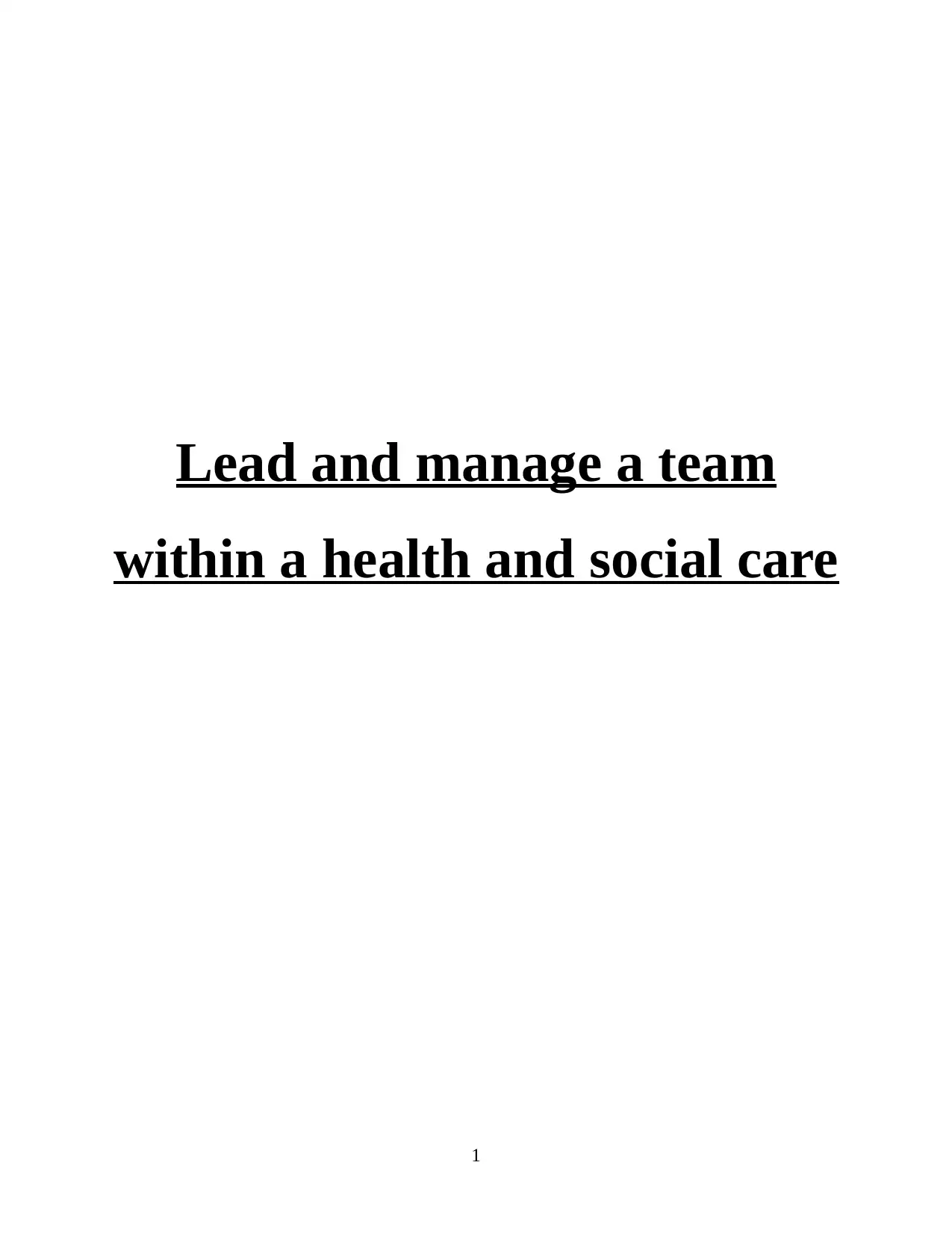
Lead and manage a team
within a health and social care
1
within a health and social care
1
Paraphrase This Document
Need a fresh take? Get an instant paraphrase of this document with our AI Paraphraser
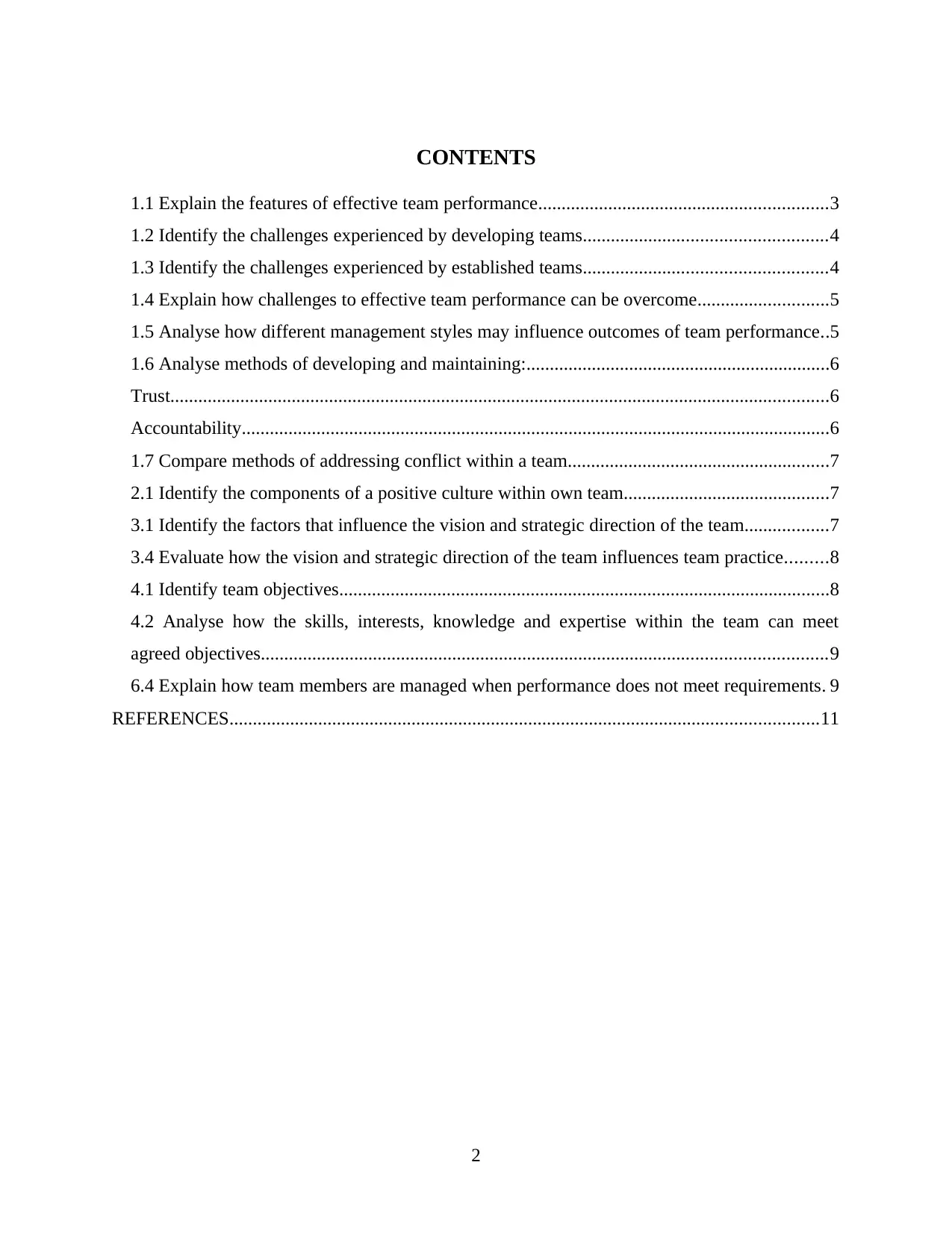
CONTENTS
1.1 Explain the features of effective team performance..............................................................3
1.2 Identify the challenges experienced by developing teams....................................................4
1.3 Identify the challenges experienced by established teams....................................................4
1.4 Explain how challenges to effective team performance can be overcome............................5
1.5 Analyse how different management styles may influence outcomes of team performance..5
1.6 Analyse methods of developing and maintaining:.................................................................6
Trust.............................................................................................................................................6
Accountability..............................................................................................................................6
1.7 Compare methods of addressing conflict within a team........................................................7
2.1 Identify the components of a positive culture within own team............................................7
3.1 Identify the factors that influence the vision and strategic direction of the team..................7
3.4 Evaluate how the vision and strategic direction of the team influences team practice.........8
4.1 Identify team objectives.........................................................................................................8
4.2 Analyse how the skills, interests, knowledge and expertise within the team can meet
agreed objectives.........................................................................................................................9
6.4 Explain how team members are managed when performance does not meet requirements. 9
REFERENCES..............................................................................................................................11
2
1.1 Explain the features of effective team performance..............................................................3
1.2 Identify the challenges experienced by developing teams....................................................4
1.3 Identify the challenges experienced by established teams....................................................4
1.4 Explain how challenges to effective team performance can be overcome............................5
1.5 Analyse how different management styles may influence outcomes of team performance..5
1.6 Analyse methods of developing and maintaining:.................................................................6
Trust.............................................................................................................................................6
Accountability..............................................................................................................................6
1.7 Compare methods of addressing conflict within a team........................................................7
2.1 Identify the components of a positive culture within own team............................................7
3.1 Identify the factors that influence the vision and strategic direction of the team..................7
3.4 Evaluate how the vision and strategic direction of the team influences team practice.........8
4.1 Identify team objectives.........................................................................................................8
4.2 Analyse how the skills, interests, knowledge and expertise within the team can meet
agreed objectives.........................................................................................................................9
6.4 Explain how team members are managed when performance does not meet requirements. 9
REFERENCES..............................................................................................................................11
2
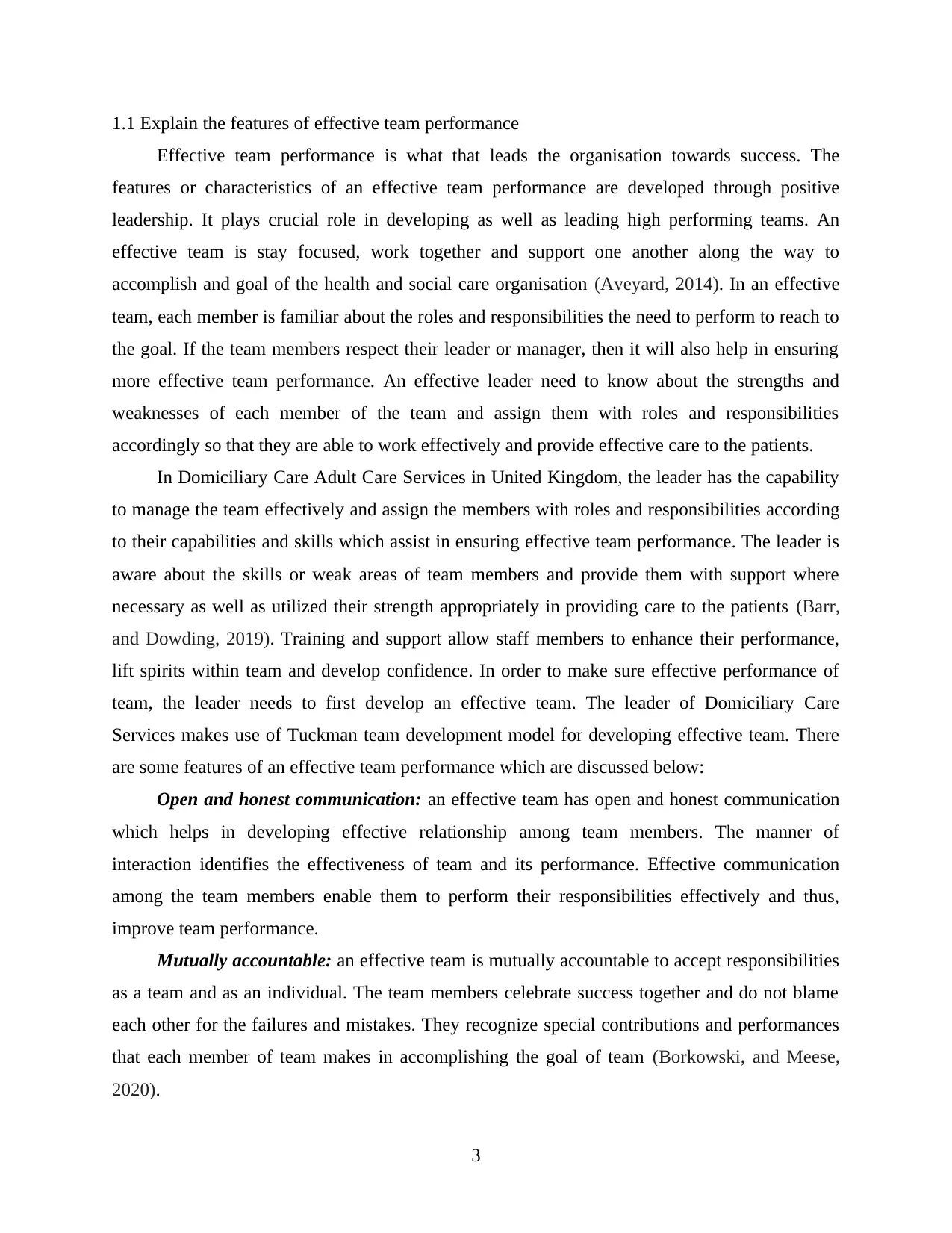
1.1 Explain the features of effective team performance
Effective team performance is what that leads the organisation towards success. The
features or characteristics of an effective team performance are developed through positive
leadership. It plays crucial role in developing as well as leading high performing teams. An
effective team is stay focused, work together and support one another along the way to
accomplish and goal of the health and social care organisation (Aveyard, 2014). In an effective
team, each member is familiar about the roles and responsibilities the need to perform to reach to
the goal. If the team members respect their leader or manager, then it will also help in ensuring
more effective team performance. An effective leader need to know about the strengths and
weaknesses of each member of the team and assign them with roles and responsibilities
accordingly so that they are able to work effectively and provide effective care to the patients.
In Domiciliary Care Adult Care Services in United Kingdom, the leader has the capability
to manage the team effectively and assign the members with roles and responsibilities according
to their capabilities and skills which assist in ensuring effective team performance. The leader is
aware about the skills or weak areas of team members and provide them with support where
necessary as well as utilized their strength appropriately in providing care to the patients (Barr,
and Dowding, 2019). Training and support allow staff members to enhance their performance,
lift spirits within team and develop confidence. In order to make sure effective performance of
team, the leader needs to first develop an effective team. The leader of Domiciliary Care
Services makes use of Tuckman team development model for developing effective team. There
are some features of an effective team performance which are discussed below:
Open and honest communication: an effective team has open and honest communication
which helps in developing effective relationship among team members. The manner of
interaction identifies the effectiveness of team and its performance. Effective communication
among the team members enable them to perform their responsibilities effectively and thus,
improve team performance.
Mutually accountable: an effective team is mutually accountable to accept responsibilities
as a team and as an individual. The team members celebrate success together and do not blame
each other for the failures and mistakes. They recognize special contributions and performances
that each member of team makes in accomplishing the goal of team (Borkowski, and Meese,
2020).
3
Effective team performance is what that leads the organisation towards success. The
features or characteristics of an effective team performance are developed through positive
leadership. It plays crucial role in developing as well as leading high performing teams. An
effective team is stay focused, work together and support one another along the way to
accomplish and goal of the health and social care organisation (Aveyard, 2014). In an effective
team, each member is familiar about the roles and responsibilities the need to perform to reach to
the goal. If the team members respect their leader or manager, then it will also help in ensuring
more effective team performance. An effective leader need to know about the strengths and
weaknesses of each member of the team and assign them with roles and responsibilities
accordingly so that they are able to work effectively and provide effective care to the patients.
In Domiciliary Care Adult Care Services in United Kingdom, the leader has the capability
to manage the team effectively and assign the members with roles and responsibilities according
to their capabilities and skills which assist in ensuring effective team performance. The leader is
aware about the skills or weak areas of team members and provide them with support where
necessary as well as utilized their strength appropriately in providing care to the patients (Barr,
and Dowding, 2019). Training and support allow staff members to enhance their performance,
lift spirits within team and develop confidence. In order to make sure effective performance of
team, the leader needs to first develop an effective team. The leader of Domiciliary Care
Services makes use of Tuckman team development model for developing effective team. There
are some features of an effective team performance which are discussed below:
Open and honest communication: an effective team has open and honest communication
which helps in developing effective relationship among team members. The manner of
interaction identifies the effectiveness of team and its performance. Effective communication
among the team members enable them to perform their responsibilities effectively and thus,
improve team performance.
Mutually accountable: an effective team is mutually accountable to accept responsibilities
as a team and as an individual. The team members celebrate success together and do not blame
each other for the failures and mistakes. They recognize special contributions and performances
that each member of team makes in accomplishing the goal of team (Borkowski, and Meese,
2020).
3
⊘ This is a preview!⊘
Do you want full access?
Subscribe today to unlock all pages.

Trusted by 1+ million students worldwide
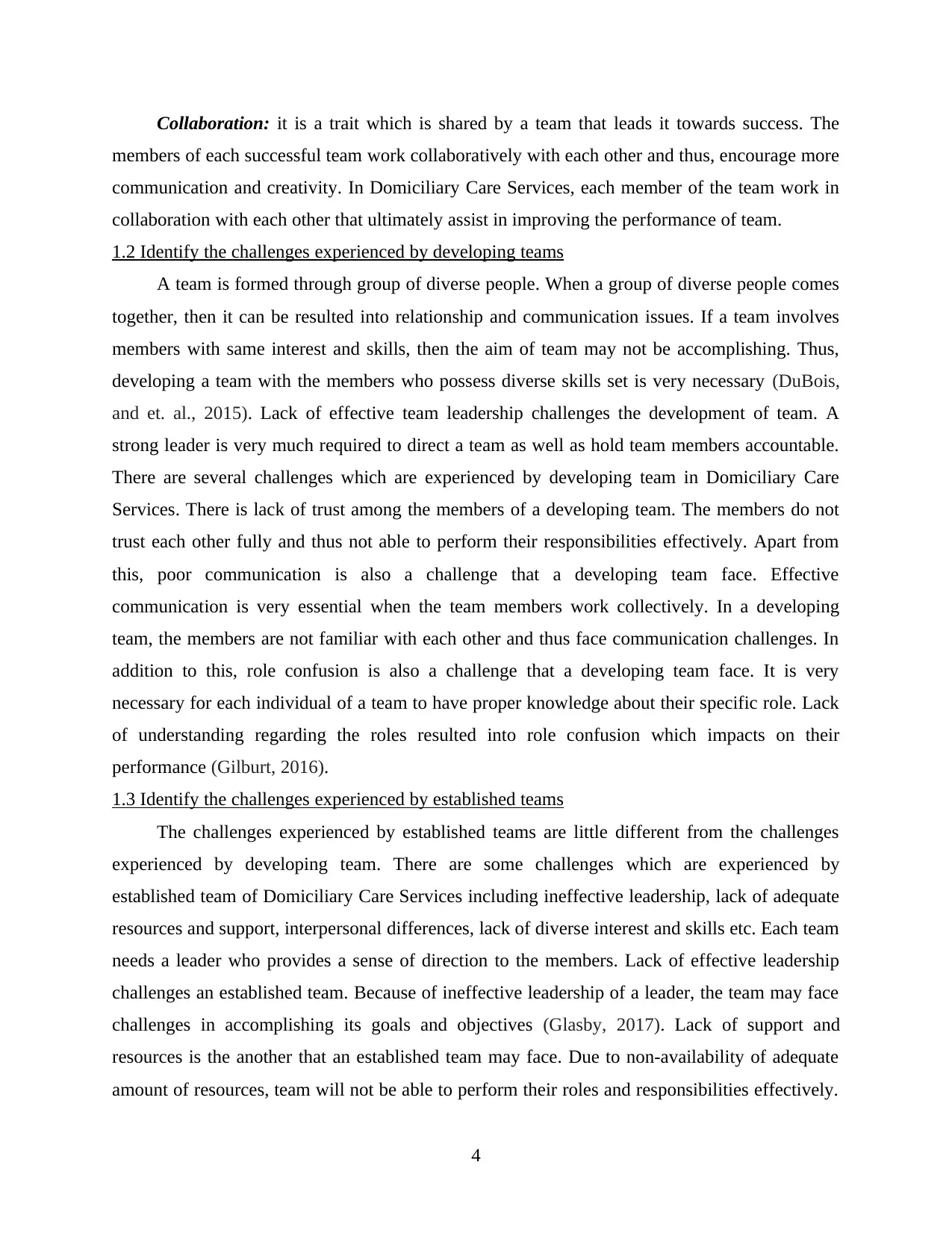
Collaboration: it is a trait which is shared by a team that leads it towards success. The
members of each successful team work collaboratively with each other and thus, encourage more
communication and creativity. In Domiciliary Care Services, each member of the team work in
collaboration with each other that ultimately assist in improving the performance of team.
1.2 Identify the challenges experienced by developing teams
A team is formed through group of diverse people. When a group of diverse people comes
together, then it can be resulted into relationship and communication issues. If a team involves
members with same interest and skills, then the aim of team may not be accomplishing. Thus,
developing a team with the members who possess diverse skills set is very necessary (DuBois,
and et. al., 2015). Lack of effective team leadership challenges the development of team. A
strong leader is very much required to direct a team as well as hold team members accountable.
There are several challenges which are experienced by developing team in Domiciliary Care
Services. There is lack of trust among the members of a developing team. The members do not
trust each other fully and thus not able to perform their responsibilities effectively. Apart from
this, poor communication is also a challenge that a developing team face. Effective
communication is very essential when the team members work collectively. In a developing
team, the members are not familiar with each other and thus face communication challenges. In
addition to this, role confusion is also a challenge that a developing team face. It is very
necessary for each individual of a team to have proper knowledge about their specific role. Lack
of understanding regarding the roles resulted into role confusion which impacts on their
performance (Gilburt, 2016).
1.3 Identify the challenges experienced by established teams
The challenges experienced by established teams are little different from the challenges
experienced by developing team. There are some challenges which are experienced by
established team of Domiciliary Care Services including ineffective leadership, lack of adequate
resources and support, interpersonal differences, lack of diverse interest and skills etc. Each team
needs a leader who provides a sense of direction to the members. Lack of effective leadership
challenges an established team. Because of ineffective leadership of a leader, the team may face
challenges in accomplishing its goals and objectives (Glasby, 2017). Lack of support and
resources is the another that an established team may face. Due to non-availability of adequate
amount of resources, team will not be able to perform their roles and responsibilities effectively.
4
members of each successful team work collaboratively with each other and thus, encourage more
communication and creativity. In Domiciliary Care Services, each member of the team work in
collaboration with each other that ultimately assist in improving the performance of team.
1.2 Identify the challenges experienced by developing teams
A team is formed through group of diverse people. When a group of diverse people comes
together, then it can be resulted into relationship and communication issues. If a team involves
members with same interest and skills, then the aim of team may not be accomplishing. Thus,
developing a team with the members who possess diverse skills set is very necessary (DuBois,
and et. al., 2015). Lack of effective team leadership challenges the development of team. A
strong leader is very much required to direct a team as well as hold team members accountable.
There are several challenges which are experienced by developing team in Domiciliary Care
Services. There is lack of trust among the members of a developing team. The members do not
trust each other fully and thus not able to perform their responsibilities effectively. Apart from
this, poor communication is also a challenge that a developing team face. Effective
communication is very essential when the team members work collectively. In a developing
team, the members are not familiar with each other and thus face communication challenges. In
addition to this, role confusion is also a challenge that a developing team face. It is very
necessary for each individual of a team to have proper knowledge about their specific role. Lack
of understanding regarding the roles resulted into role confusion which impacts on their
performance (Gilburt, 2016).
1.3 Identify the challenges experienced by established teams
The challenges experienced by established teams are little different from the challenges
experienced by developing team. There are some challenges which are experienced by
established team of Domiciliary Care Services including ineffective leadership, lack of adequate
resources and support, interpersonal differences, lack of diverse interest and skills etc. Each team
needs a leader who provides a sense of direction to the members. Lack of effective leadership
challenges an established team. Because of ineffective leadership of a leader, the team may face
challenges in accomplishing its goals and objectives (Glasby, 2017). Lack of support and
resources is the another that an established team may face. Due to non-availability of adequate
amount of resources, team will not be able to perform their roles and responsibilities effectively.
4
Paraphrase This Document
Need a fresh take? Get an instant paraphrase of this document with our AI Paraphraser
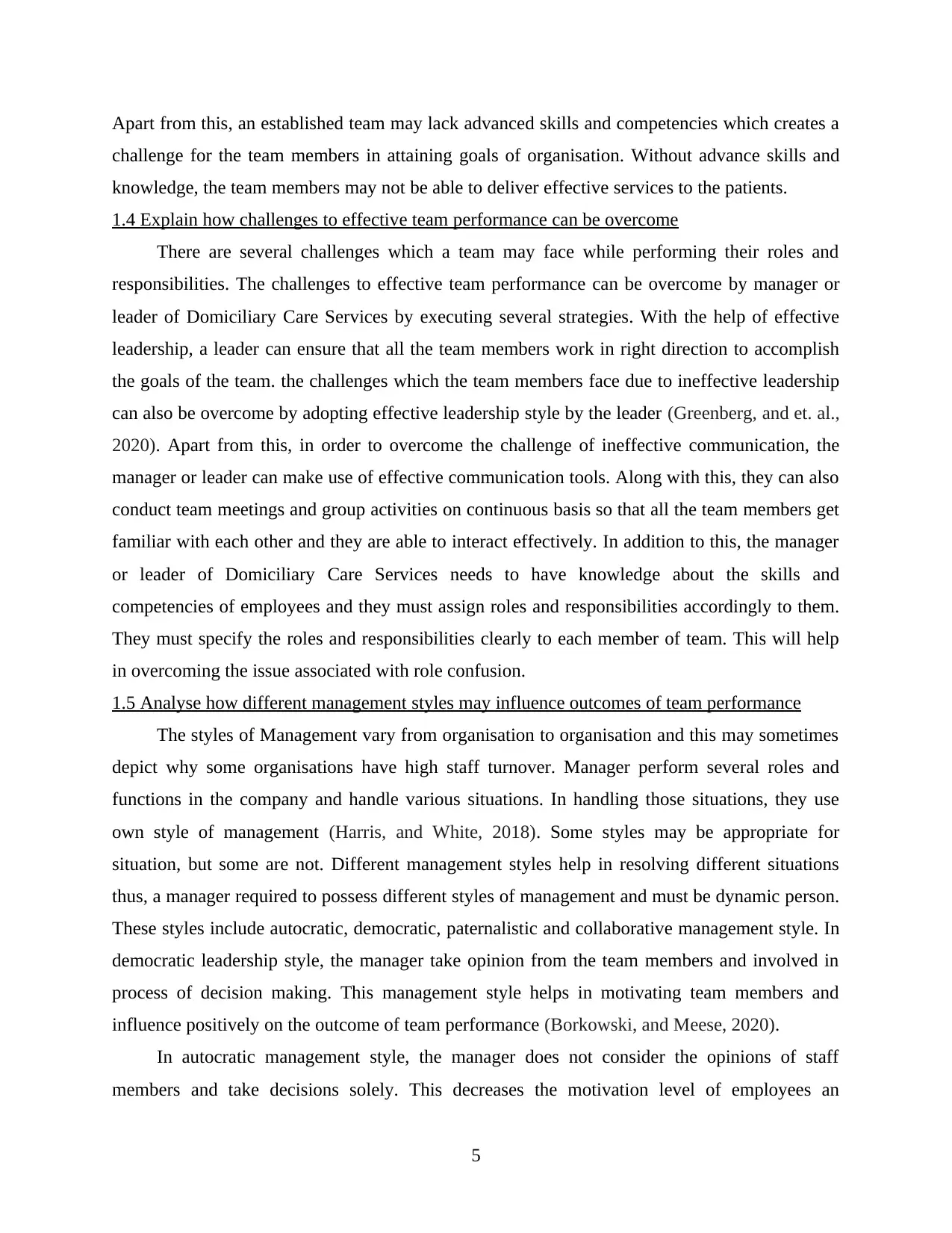
Apart from this, an established team may lack advanced skills and competencies which creates a
challenge for the team members in attaining goals of organisation. Without advance skills and
knowledge, the team members may not be able to deliver effective services to the patients.
1.4 Explain how challenges to effective team performance can be overcome
There are several challenges which a team may face while performing their roles and
responsibilities. The challenges to effective team performance can be overcome by manager or
leader of Domiciliary Care Services by executing several strategies. With the help of effective
leadership, a leader can ensure that all the team members work in right direction to accomplish
the goals of the team. the challenges which the team members face due to ineffective leadership
can also be overcome by adopting effective leadership style by the leader (Greenberg, and et. al.,
2020). Apart from this, in order to overcome the challenge of ineffective communication, the
manager or leader can make use of effective communication tools. Along with this, they can also
conduct team meetings and group activities on continuous basis so that all the team members get
familiar with each other and they are able to interact effectively. In addition to this, the manager
or leader of Domiciliary Care Services needs to have knowledge about the skills and
competencies of employees and they must assign roles and responsibilities accordingly to them.
They must specify the roles and responsibilities clearly to each member of team. This will help
in overcoming the issue associated with role confusion.
1.5 Analyse how different management styles may influence outcomes of team performance
The styles of Management vary from organisation to organisation and this may sometimes
depict why some organisations have high staff turnover. Manager perform several roles and
functions in the company and handle various situations. In handling those situations, they use
own style of management (Harris, and White, 2018). Some styles may be appropriate for
situation, but some are not. Different management styles help in resolving different situations
thus, a manager required to possess different styles of management and must be dynamic person.
These styles include autocratic, democratic, paternalistic and collaborative management style. In
democratic leadership style, the manager take opinion from the team members and involved in
process of decision making. This management style helps in motivating team members and
influence positively on the outcome of team performance (Borkowski, and Meese, 2020).
In autocratic management style, the manager does not consider the opinions of staff
members and take decisions solely. This decreases the motivation level of employees an
5
challenge for the team members in attaining goals of organisation. Without advance skills and
knowledge, the team members may not be able to deliver effective services to the patients.
1.4 Explain how challenges to effective team performance can be overcome
There are several challenges which a team may face while performing their roles and
responsibilities. The challenges to effective team performance can be overcome by manager or
leader of Domiciliary Care Services by executing several strategies. With the help of effective
leadership, a leader can ensure that all the team members work in right direction to accomplish
the goals of the team. the challenges which the team members face due to ineffective leadership
can also be overcome by adopting effective leadership style by the leader (Greenberg, and et. al.,
2020). Apart from this, in order to overcome the challenge of ineffective communication, the
manager or leader can make use of effective communication tools. Along with this, they can also
conduct team meetings and group activities on continuous basis so that all the team members get
familiar with each other and they are able to interact effectively. In addition to this, the manager
or leader of Domiciliary Care Services needs to have knowledge about the skills and
competencies of employees and they must assign roles and responsibilities accordingly to them.
They must specify the roles and responsibilities clearly to each member of team. This will help
in overcoming the issue associated with role confusion.
1.5 Analyse how different management styles may influence outcomes of team performance
The styles of Management vary from organisation to organisation and this may sometimes
depict why some organisations have high staff turnover. Manager perform several roles and
functions in the company and handle various situations. In handling those situations, they use
own style of management (Harris, and White, 2018). Some styles may be appropriate for
situation, but some are not. Different management styles help in resolving different situations
thus, a manager required to possess different styles of management and must be dynamic person.
These styles include autocratic, democratic, paternalistic and collaborative management style. In
democratic leadership style, the manager take opinion from the team members and involved in
process of decision making. This management style helps in motivating team members and
influence positively on the outcome of team performance (Borkowski, and Meese, 2020).
In autocratic management style, the manager does not consider the opinions of staff
members and take decisions solely. This decreases the motivation level of employees an
5
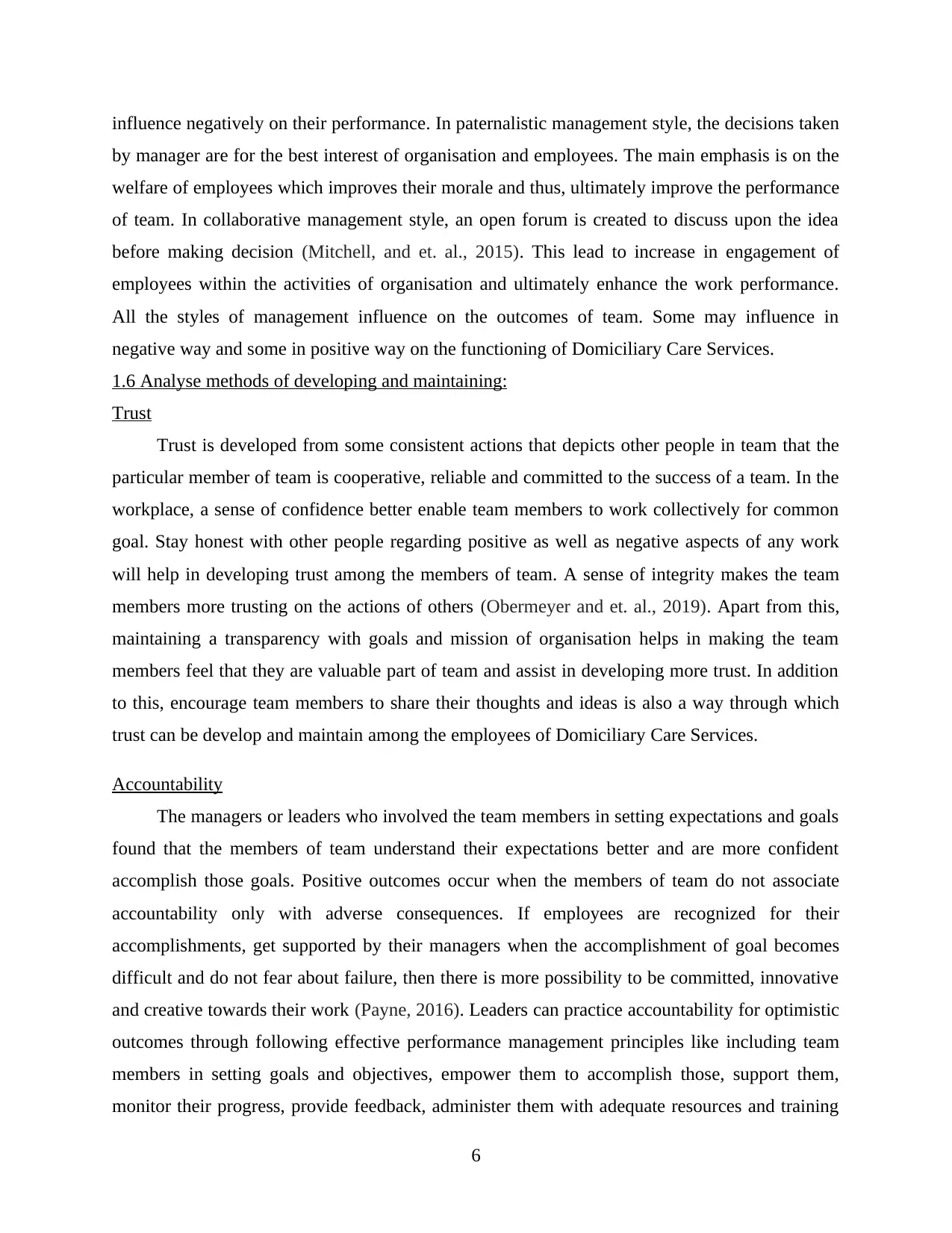
influence negatively on their performance. In paternalistic management style, the decisions taken
by manager are for the best interest of organisation and employees. The main emphasis is on the
welfare of employees which improves their morale and thus, ultimately improve the performance
of team. In collaborative management style, an open forum is created to discuss upon the idea
before making decision (Mitchell, and et. al., 2015). This lead to increase in engagement of
employees within the activities of organisation and ultimately enhance the work performance.
All the styles of management influence on the outcomes of team. Some may influence in
negative way and some in positive way on the functioning of Domiciliary Care Services.
1.6 Analyse methods of developing and maintaining:
Trust
Trust is developed from some consistent actions that depicts other people in team that the
particular member of team is cooperative, reliable and committed to the success of a team. In the
workplace, a sense of confidence better enable team members to work collectively for common
goal. Stay honest with other people regarding positive as well as negative aspects of any work
will help in developing trust among the members of team. A sense of integrity makes the team
members more trusting on the actions of others (Obermeyer and et. al., 2019). Apart from this,
maintaining a transparency with goals and mission of organisation helps in making the team
members feel that they are valuable part of team and assist in developing more trust. In addition
to this, encourage team members to share their thoughts and ideas is also a way through which
trust can be develop and maintain among the employees of Domiciliary Care Services.
Accountability
The managers or leaders who involved the team members in setting expectations and goals
found that the members of team understand their expectations better and are more confident
accomplish those goals. Positive outcomes occur when the members of team do not associate
accountability only with adverse consequences. If employees are recognized for their
accomplishments, get supported by their managers when the accomplishment of goal becomes
difficult and do not fear about failure, then there is more possibility to be committed, innovative
and creative towards their work (Payne, 2016). Leaders can practice accountability for optimistic
outcomes through following effective performance management principles like including team
members in setting goals and objectives, empower them to accomplish those, support them,
monitor their progress, provide feedback, administer them with adequate resources and training
6
by manager are for the best interest of organisation and employees. The main emphasis is on the
welfare of employees which improves their morale and thus, ultimately improve the performance
of team. In collaborative management style, an open forum is created to discuss upon the idea
before making decision (Mitchell, and et. al., 2015). This lead to increase in engagement of
employees within the activities of organisation and ultimately enhance the work performance.
All the styles of management influence on the outcomes of team. Some may influence in
negative way and some in positive way on the functioning of Domiciliary Care Services.
1.6 Analyse methods of developing and maintaining:
Trust
Trust is developed from some consistent actions that depicts other people in team that the
particular member of team is cooperative, reliable and committed to the success of a team. In the
workplace, a sense of confidence better enable team members to work collectively for common
goal. Stay honest with other people regarding positive as well as negative aspects of any work
will help in developing trust among the members of team. A sense of integrity makes the team
members more trusting on the actions of others (Obermeyer and et. al., 2019). Apart from this,
maintaining a transparency with goals and mission of organisation helps in making the team
members feel that they are valuable part of team and assist in developing more trust. In addition
to this, encourage team members to share their thoughts and ideas is also a way through which
trust can be develop and maintain among the employees of Domiciliary Care Services.
Accountability
The managers or leaders who involved the team members in setting expectations and goals
found that the members of team understand their expectations better and are more confident
accomplish those goals. Positive outcomes occur when the members of team do not associate
accountability only with adverse consequences. If employees are recognized for their
accomplishments, get supported by their managers when the accomplishment of goal becomes
difficult and do not fear about failure, then there is more possibility to be committed, innovative
and creative towards their work (Payne, 2016). Leaders can practice accountability for optimistic
outcomes through following effective performance management principles like including team
members in setting goals and objectives, empower them to accomplish those, support them,
monitor their progress, provide feedback, administer them with adequate resources and training
6
⊘ This is a preview!⊘
Do you want full access?
Subscribe today to unlock all pages.

Trusted by 1+ million students worldwide
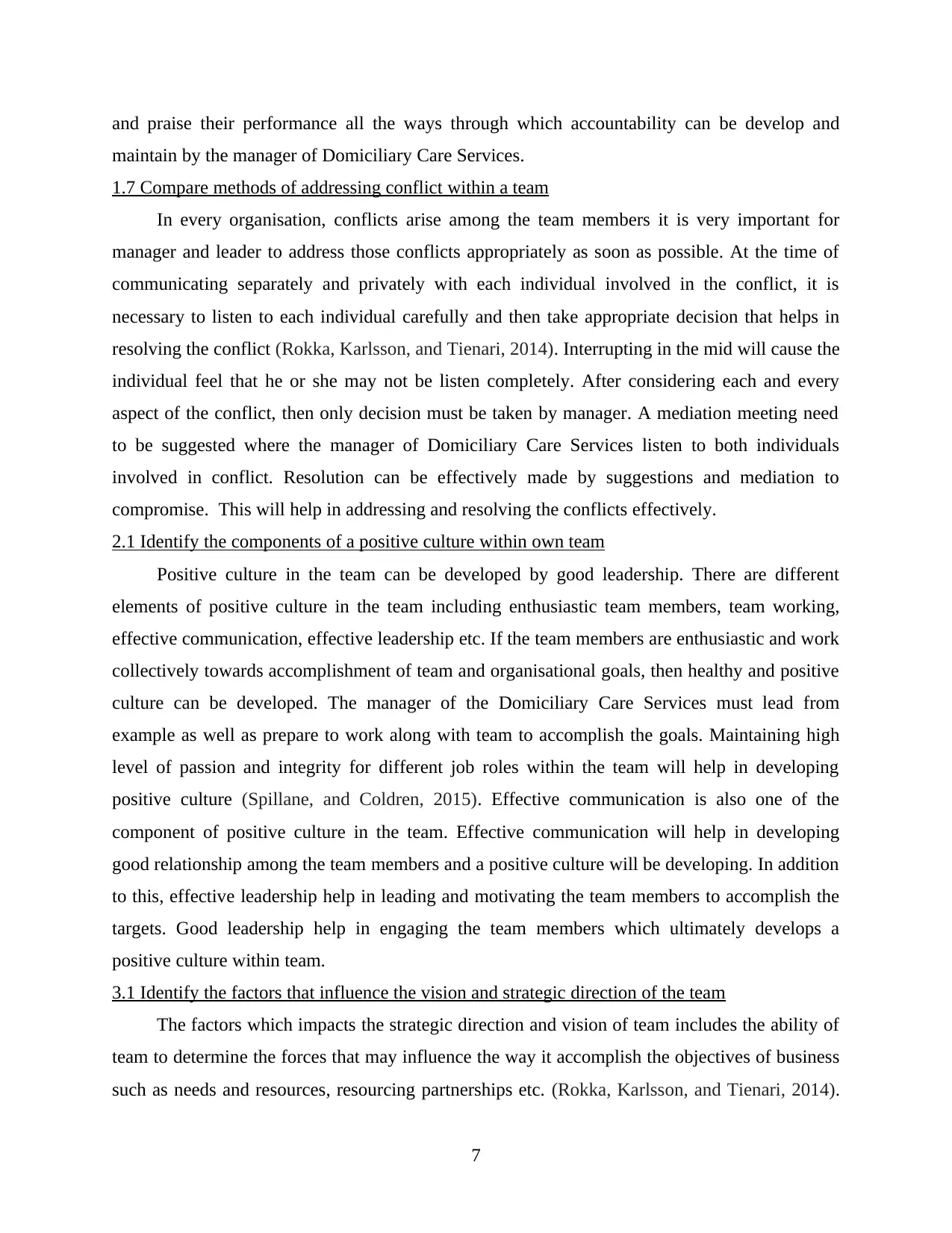
and praise their performance all the ways through which accountability can be develop and
maintain by the manager of Domiciliary Care Services.
1.7 Compare methods of addressing conflict within a team
In every organisation, conflicts arise among the team members it is very important for
manager and leader to address those conflicts appropriately as soon as possible. At the time of
communicating separately and privately with each individual involved in the conflict, it is
necessary to listen to each individual carefully and then take appropriate decision that helps in
resolving the conflict (Rokka, Karlsson, and Tienari, 2014). Interrupting in the mid will cause the
individual feel that he or she may not be listen completely. After considering each and every
aspect of the conflict, then only decision must be taken by manager. A mediation meeting need
to be suggested where the manager of Domiciliary Care Services listen to both individuals
involved in conflict. Resolution can be effectively made by suggestions and mediation to
compromise. This will help in addressing and resolving the conflicts effectively.
2.1 Identify the components of a positive culture within own team
Positive culture in the team can be developed by good leadership. There are different
elements of positive culture in the team including enthusiastic team members, team working,
effective communication, effective leadership etc. If the team members are enthusiastic and work
collectively towards accomplishment of team and organisational goals, then healthy and positive
culture can be developed. The manager of the Domiciliary Care Services must lead from
example as well as prepare to work along with team to accomplish the goals. Maintaining high
level of passion and integrity for different job roles within the team will help in developing
positive culture (Spillane, and Coldren, 2015). Effective communication is also one of the
component of positive culture in the team. Effective communication will help in developing
good relationship among the team members and a positive culture will be developing. In addition
to this, effective leadership help in leading and motivating the team members to accomplish the
targets. Good leadership help in engaging the team members which ultimately develops a
positive culture within team.
3.1 Identify the factors that influence the vision and strategic direction of the team
The factors which impacts the strategic direction and vision of team includes the ability of
team to determine the forces that may influence the way it accomplish the objectives of business
such as needs and resources, resourcing partnerships etc. (Rokka, Karlsson, and Tienari, 2014).
7
maintain by the manager of Domiciliary Care Services.
1.7 Compare methods of addressing conflict within a team
In every organisation, conflicts arise among the team members it is very important for
manager and leader to address those conflicts appropriately as soon as possible. At the time of
communicating separately and privately with each individual involved in the conflict, it is
necessary to listen to each individual carefully and then take appropriate decision that helps in
resolving the conflict (Rokka, Karlsson, and Tienari, 2014). Interrupting in the mid will cause the
individual feel that he or she may not be listen completely. After considering each and every
aspect of the conflict, then only decision must be taken by manager. A mediation meeting need
to be suggested where the manager of Domiciliary Care Services listen to both individuals
involved in conflict. Resolution can be effectively made by suggestions and mediation to
compromise. This will help in addressing and resolving the conflicts effectively.
2.1 Identify the components of a positive culture within own team
Positive culture in the team can be developed by good leadership. There are different
elements of positive culture in the team including enthusiastic team members, team working,
effective communication, effective leadership etc. If the team members are enthusiastic and work
collectively towards accomplishment of team and organisational goals, then healthy and positive
culture can be developed. The manager of the Domiciliary Care Services must lead from
example as well as prepare to work along with team to accomplish the goals. Maintaining high
level of passion and integrity for different job roles within the team will help in developing
positive culture (Spillane, and Coldren, 2015). Effective communication is also one of the
component of positive culture in the team. Effective communication will help in developing
good relationship among the team members and a positive culture will be developing. In addition
to this, effective leadership help in leading and motivating the team members to accomplish the
targets. Good leadership help in engaging the team members which ultimately develops a
positive culture within team.
3.1 Identify the factors that influence the vision and strategic direction of the team
The factors which impacts the strategic direction and vision of team includes the ability of
team to determine the forces that may influence the way it accomplish the objectives of business
such as needs and resources, resourcing partnerships etc. (Rokka, Karlsson, and Tienari, 2014).
7
Paraphrase This Document
Need a fresh take? Get an instant paraphrase of this document with our AI Paraphraser
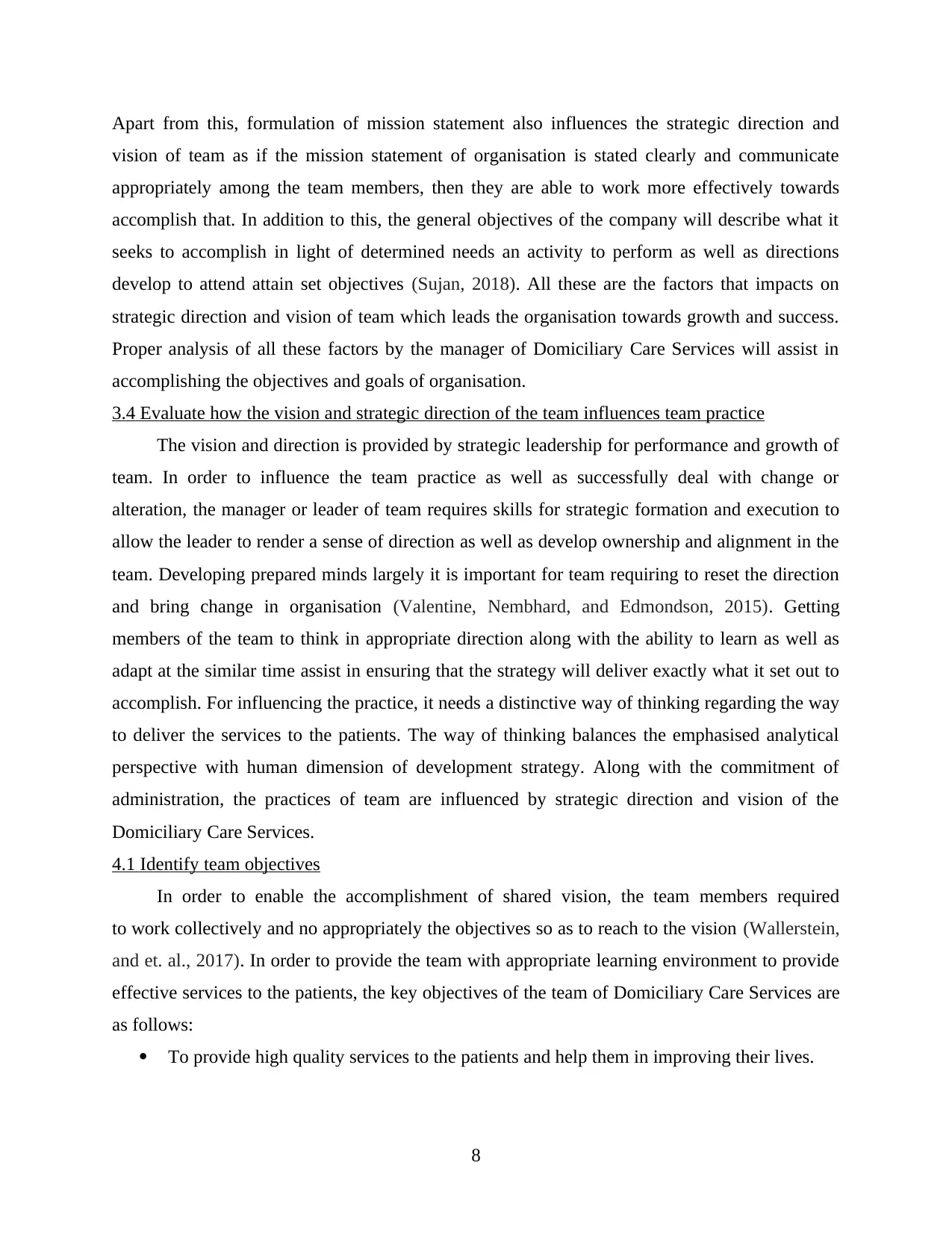
Apart from this, formulation of mission statement also influences the strategic direction and
vision of team as if the mission statement of organisation is stated clearly and communicate
appropriately among the team members, then they are able to work more effectively towards
accomplish that. In addition to this, the general objectives of the company will describe what it
seeks to accomplish in light of determined needs an activity to perform as well as directions
develop to attend attain set objectives (Sujan, 2018). All these are the factors that impacts on
strategic direction and vision of team which leads the organisation towards growth and success.
Proper analysis of all these factors by the manager of Domiciliary Care Services will assist in
accomplishing the objectives and goals of organisation.
3.4 Evaluate how the vision and strategic direction of the team influences team practice
The vision and direction is provided by strategic leadership for performance and growth of
team. In order to influence the team practice as well as successfully deal with change or
alteration, the manager or leader of team requires skills for strategic formation and execution to
allow the leader to render a sense of direction as well as develop ownership and alignment in the
team. Developing prepared minds largely it is important for team requiring to reset the direction
and bring change in organisation (Valentine, Nembhard, and Edmondson, 2015). Getting
members of the team to think in appropriate direction along with the ability to learn as well as
adapt at the similar time assist in ensuring that the strategy will deliver exactly what it set out to
accomplish. For influencing the practice, it needs a distinctive way of thinking regarding the way
to deliver the services to the patients. The way of thinking balances the emphasised analytical
perspective with human dimension of development strategy. Along with the commitment of
administration, the practices of team are influenced by strategic direction and vision of the
Domiciliary Care Services.
4.1 Identify team objectives
In order to enable the accomplishment of shared vision, the team members required
to work collectively and no appropriately the objectives so as to reach to the vision (Wallerstein,
and et. al., 2017). In order to provide the team with appropriate learning environment to provide
effective services to the patients, the key objectives of the team of Domiciliary Care Services are
as follows:
To provide high quality services to the patients and help them in improving their lives.
8
vision of team as if the mission statement of organisation is stated clearly and communicate
appropriately among the team members, then they are able to work more effectively towards
accomplish that. In addition to this, the general objectives of the company will describe what it
seeks to accomplish in light of determined needs an activity to perform as well as directions
develop to attend attain set objectives (Sujan, 2018). All these are the factors that impacts on
strategic direction and vision of team which leads the organisation towards growth and success.
Proper analysis of all these factors by the manager of Domiciliary Care Services will assist in
accomplishing the objectives and goals of organisation.
3.4 Evaluate how the vision and strategic direction of the team influences team practice
The vision and direction is provided by strategic leadership for performance and growth of
team. In order to influence the team practice as well as successfully deal with change or
alteration, the manager or leader of team requires skills for strategic formation and execution to
allow the leader to render a sense of direction as well as develop ownership and alignment in the
team. Developing prepared minds largely it is important for team requiring to reset the direction
and bring change in organisation (Valentine, Nembhard, and Edmondson, 2015). Getting
members of the team to think in appropriate direction along with the ability to learn as well as
adapt at the similar time assist in ensuring that the strategy will deliver exactly what it set out to
accomplish. For influencing the practice, it needs a distinctive way of thinking regarding the way
to deliver the services to the patients. The way of thinking balances the emphasised analytical
perspective with human dimension of development strategy. Along with the commitment of
administration, the practices of team are influenced by strategic direction and vision of the
Domiciliary Care Services.
4.1 Identify team objectives
In order to enable the accomplishment of shared vision, the team members required
to work collectively and no appropriately the objectives so as to reach to the vision (Wallerstein,
and et. al., 2017). In order to provide the team with appropriate learning environment to provide
effective services to the patients, the key objectives of the team of Domiciliary Care Services are
as follows:
To provide high quality services to the patients and help them in improving their lives.
8
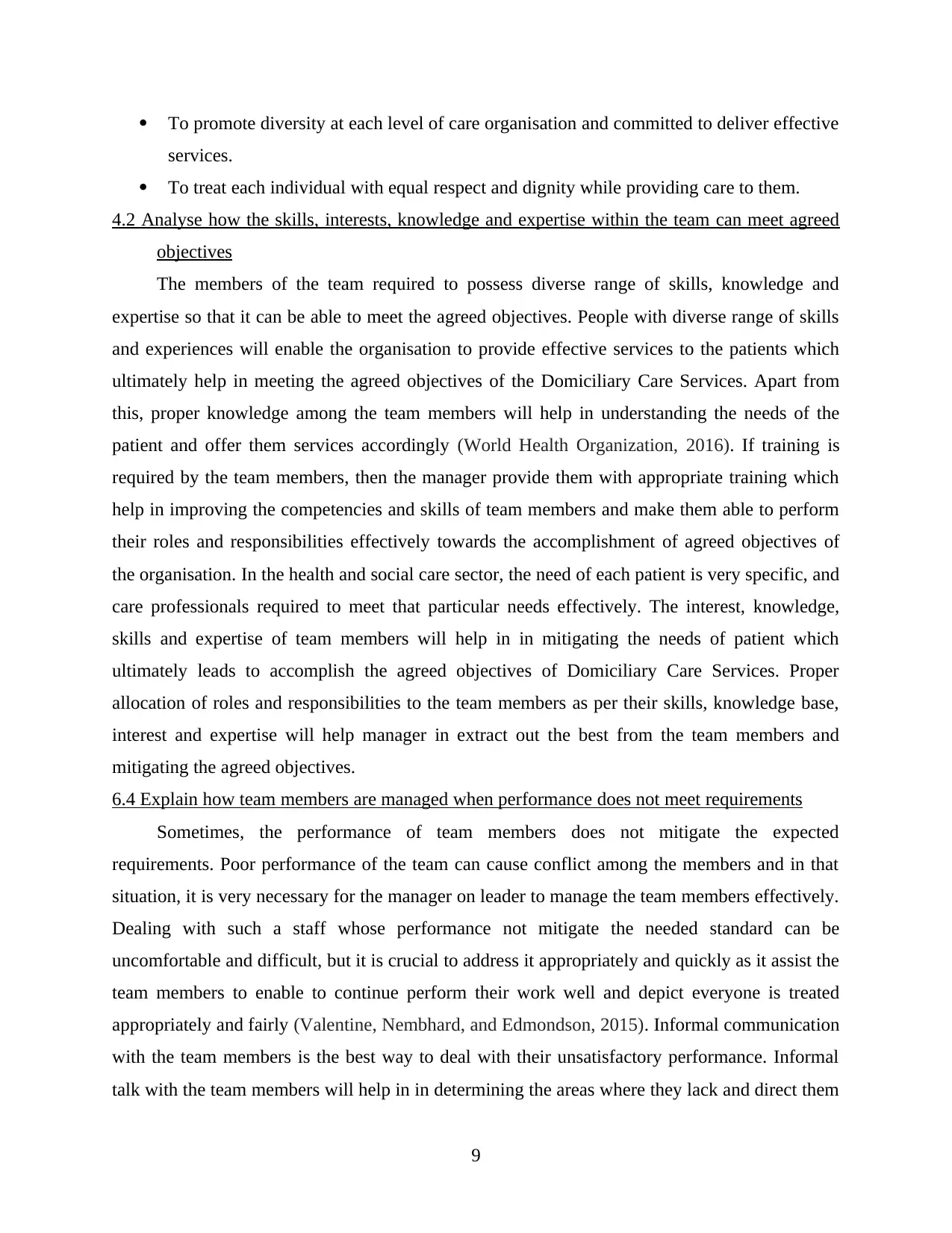
To promote diversity at each level of care organisation and committed to deliver effective
services.
To treat each individual with equal respect and dignity while providing care to them.
4.2 Analyse how the skills, interests, knowledge and expertise within the team can meet agreed
objectives
The members of the team required to possess diverse range of skills, knowledge and
expertise so that it can be able to meet the agreed objectives. People with diverse range of skills
and experiences will enable the organisation to provide effective services to the patients which
ultimately help in meeting the agreed objectives of the Domiciliary Care Services. Apart from
this, proper knowledge among the team members will help in understanding the needs of the
patient and offer them services accordingly (World Health Organization, 2016). If training is
required by the team members, then the manager provide them with appropriate training which
help in improving the competencies and skills of team members and make them able to perform
their roles and responsibilities effectively towards the accomplishment of agreed objectives of
the organisation. In the health and social care sector, the need of each patient is very specific, and
care professionals required to meet that particular needs effectively. The interest, knowledge,
skills and expertise of team members will help in in mitigating the needs of patient which
ultimately leads to accomplish the agreed objectives of Domiciliary Care Services. Proper
allocation of roles and responsibilities to the team members as per their skills, knowledge base,
interest and expertise will help manager in extract out the best from the team members and
mitigating the agreed objectives.
6.4 Explain how team members are managed when performance does not meet requirements
Sometimes, the performance of team members does not mitigate the expected
requirements. Poor performance of the team can cause conflict among the members and in that
situation, it is very necessary for the manager on leader to manage the team members effectively.
Dealing with such a staff whose performance not mitigate the needed standard can be
uncomfortable and difficult, but it is crucial to address it appropriately and quickly as it assist the
team members to enable to continue perform their work well and depict everyone is treated
appropriately and fairly (Valentine, Nembhard, and Edmondson, 2015). Informal communication
with the team members is the best way to deal with their unsatisfactory performance. Informal
talk with the team members will help in in determining the areas where they lack and direct them
9
services.
To treat each individual with equal respect and dignity while providing care to them.
4.2 Analyse how the skills, interests, knowledge and expertise within the team can meet agreed
objectives
The members of the team required to possess diverse range of skills, knowledge and
expertise so that it can be able to meet the agreed objectives. People with diverse range of skills
and experiences will enable the organisation to provide effective services to the patients which
ultimately help in meeting the agreed objectives of the Domiciliary Care Services. Apart from
this, proper knowledge among the team members will help in understanding the needs of the
patient and offer them services accordingly (World Health Organization, 2016). If training is
required by the team members, then the manager provide them with appropriate training which
help in improving the competencies and skills of team members and make them able to perform
their roles and responsibilities effectively towards the accomplishment of agreed objectives of
the organisation. In the health and social care sector, the need of each patient is very specific, and
care professionals required to meet that particular needs effectively. The interest, knowledge,
skills and expertise of team members will help in in mitigating the needs of patient which
ultimately leads to accomplish the agreed objectives of Domiciliary Care Services. Proper
allocation of roles and responsibilities to the team members as per their skills, knowledge base,
interest and expertise will help manager in extract out the best from the team members and
mitigating the agreed objectives.
6.4 Explain how team members are managed when performance does not meet requirements
Sometimes, the performance of team members does not mitigate the expected
requirements. Poor performance of the team can cause conflict among the members and in that
situation, it is very necessary for the manager on leader to manage the team members effectively.
Dealing with such a staff whose performance not mitigate the needed standard can be
uncomfortable and difficult, but it is crucial to address it appropriately and quickly as it assist the
team members to enable to continue perform their work well and depict everyone is treated
appropriately and fairly (Valentine, Nembhard, and Edmondson, 2015). Informal communication
with the team members is the best way to deal with their unsatisfactory performance. Informal
talk with the team members will help in in determining the areas where they lack and direct them
9
⊘ This is a preview!⊘
Do you want full access?
Subscribe today to unlock all pages.

Trusted by 1+ million students worldwide
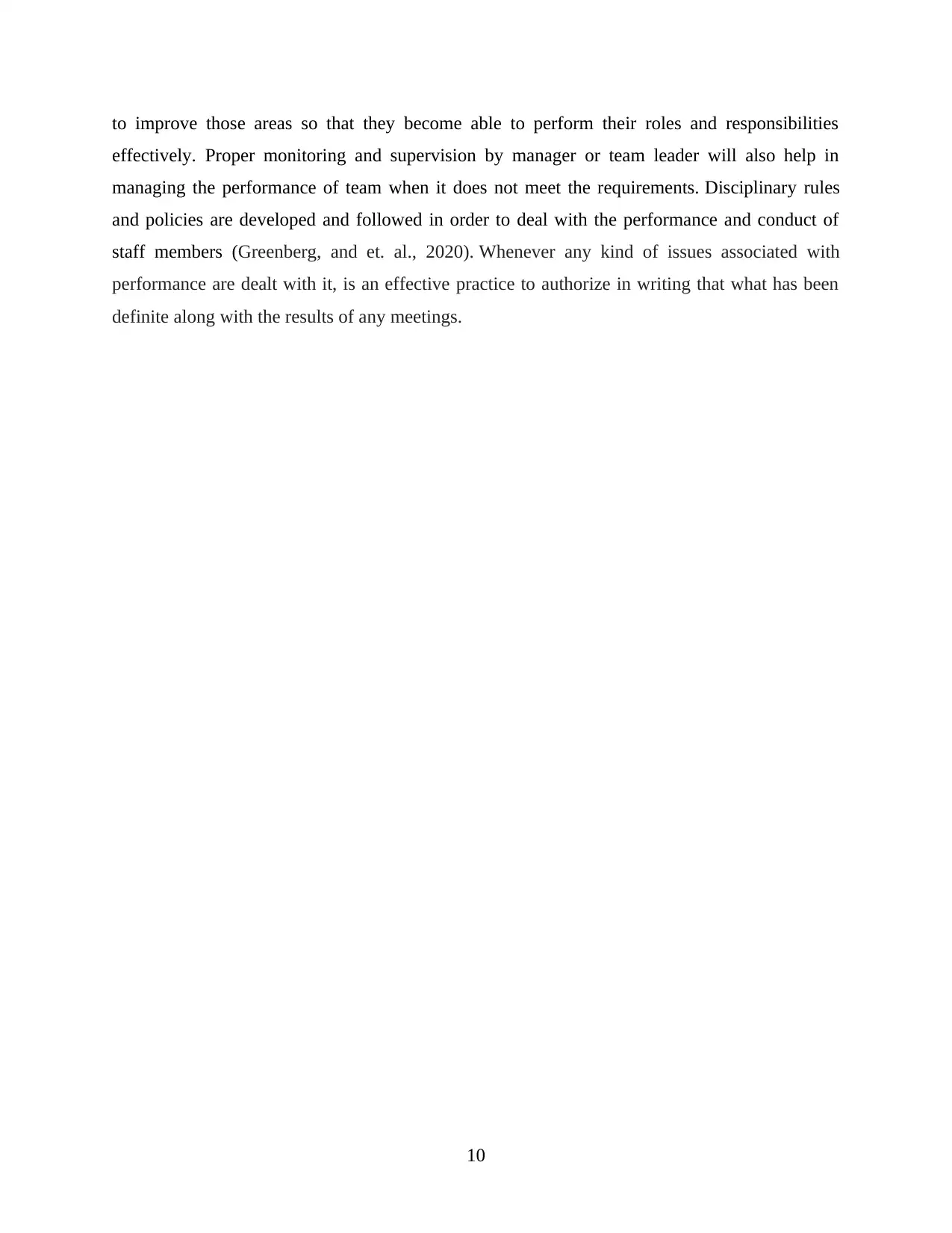
to improve those areas so that they become able to perform their roles and responsibilities
effectively. Proper monitoring and supervision by manager or team leader will also help in
managing the performance of team when it does not meet the requirements. Disciplinary rules
and policies are developed and followed in order to deal with the performance and conduct of
staff members (Greenberg, and et. al., 2020). Whenever any kind of issues associated with
performance are dealt with it, is an effective practice to authorize in writing that what has been
definite along with the results of any meetings.
10
effectively. Proper monitoring and supervision by manager or team leader will also help in
managing the performance of team when it does not meet the requirements. Disciplinary rules
and policies are developed and followed in order to deal with the performance and conduct of
staff members (Greenberg, and et. al., 2020). Whenever any kind of issues associated with
performance are dealt with it, is an effective practice to authorize in writing that what has been
definite along with the results of any meetings.
10
Paraphrase This Document
Need a fresh take? Get an instant paraphrase of this document with our AI Paraphraser
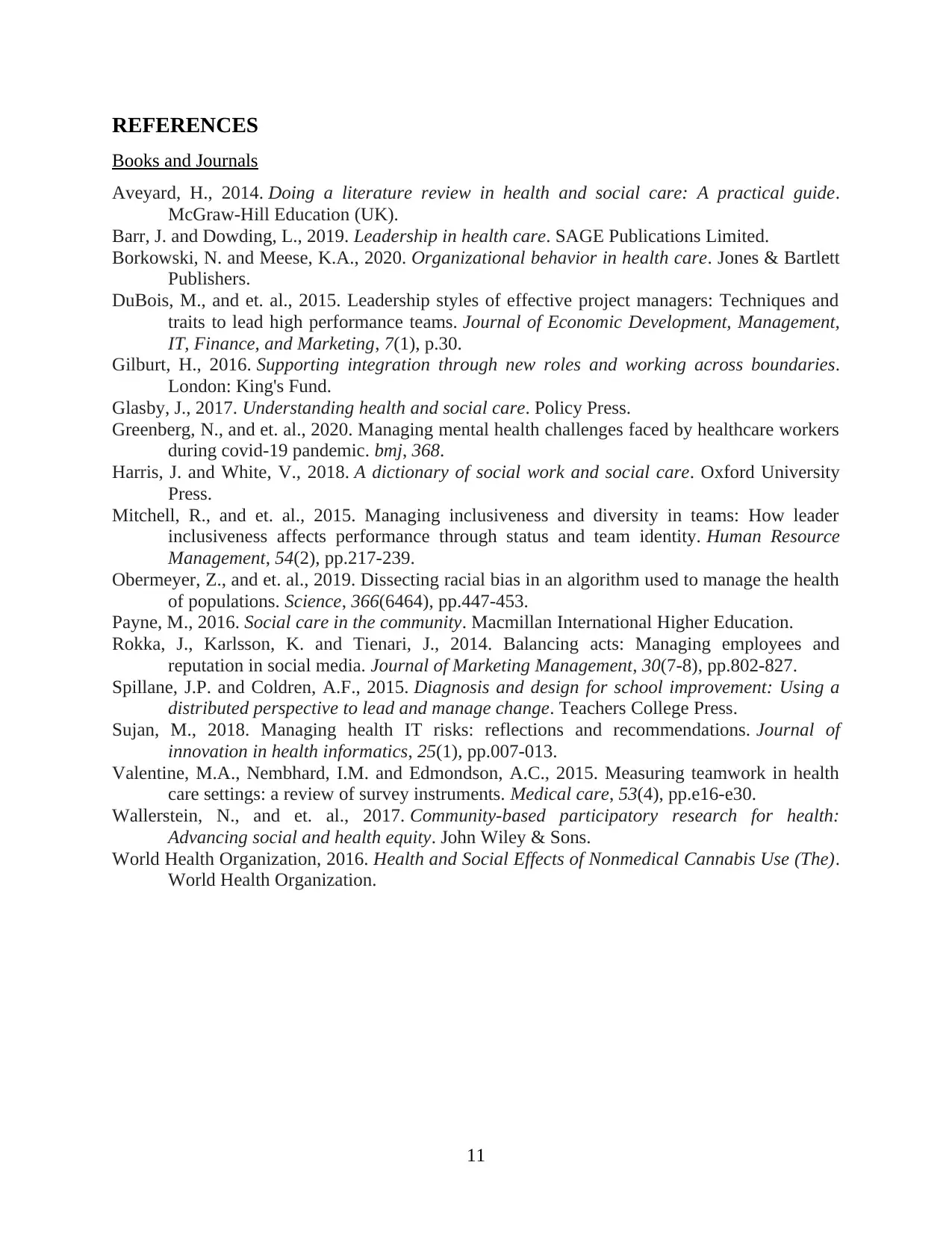
REFERENCES
Books and Journals
Aveyard, H., 2014. Doing a literature review in health and social care: A practical guide.
McGraw-Hill Education (UK).
Barr, J. and Dowding, L., 2019. Leadership in health care. SAGE Publications Limited.
Borkowski, N. and Meese, K.A., 2020. Organizational behavior in health care. Jones & Bartlett
Publishers.
DuBois, M., and et. al., 2015. Leadership styles of effective project managers: Techniques and
traits to lead high performance teams. Journal of Economic Development, Management,
IT, Finance, and Marketing, 7(1), p.30.
Gilburt, H., 2016. Supporting integration through new roles and working across boundaries.
London: King's Fund.
Glasby, J., 2017. Understanding health and social care. Policy Press.
Greenberg, N., and et. al., 2020. Managing mental health challenges faced by healthcare workers
during covid-19 pandemic. bmj, 368.
Harris, J. and White, V., 2018. A dictionary of social work and social care. Oxford University
Press.
Mitchell, R., and et. al., 2015. Managing inclusiveness and diversity in teams: How leader
inclusiveness affects performance through status and team identity. Human Resource
Management, 54(2), pp.217-239.
Obermeyer, Z., and et. al., 2019. Dissecting racial bias in an algorithm used to manage the health
of populations. Science, 366(6464), pp.447-453.
Payne, M., 2016. Social care in the community. Macmillan International Higher Education.
Rokka, J., Karlsson, K. and Tienari, J., 2014. Balancing acts: Managing employees and
reputation in social media. Journal of Marketing Management, 30(7-8), pp.802-827.
Spillane, J.P. and Coldren, A.F., 2015. Diagnosis and design for school improvement: Using a
distributed perspective to lead and manage change. Teachers College Press.
Sujan, M., 2018. Managing health IT risks: reflections and recommendations. Journal of
innovation in health informatics, 25(1), pp.007-013.
Valentine, M.A., Nembhard, I.M. and Edmondson, A.C., 2015. Measuring teamwork in health
care settings: a review of survey instruments. Medical care, 53(4), pp.e16-e30.
Wallerstein, N., and et. al., 2017. Community-based participatory research for health:
Advancing social and health equity. John Wiley & Sons.
World Health Organization, 2016. Health and Social Effects of Nonmedical Cannabis Use (The).
World Health Organization.
11
Books and Journals
Aveyard, H., 2014. Doing a literature review in health and social care: A practical guide.
McGraw-Hill Education (UK).
Barr, J. and Dowding, L., 2019. Leadership in health care. SAGE Publications Limited.
Borkowski, N. and Meese, K.A., 2020. Organizational behavior in health care. Jones & Bartlett
Publishers.
DuBois, M., and et. al., 2015. Leadership styles of effective project managers: Techniques and
traits to lead high performance teams. Journal of Economic Development, Management,
IT, Finance, and Marketing, 7(1), p.30.
Gilburt, H., 2016. Supporting integration through new roles and working across boundaries.
London: King's Fund.
Glasby, J., 2017. Understanding health and social care. Policy Press.
Greenberg, N., and et. al., 2020. Managing mental health challenges faced by healthcare workers
during covid-19 pandemic. bmj, 368.
Harris, J. and White, V., 2018. A dictionary of social work and social care. Oxford University
Press.
Mitchell, R., and et. al., 2015. Managing inclusiveness and diversity in teams: How leader
inclusiveness affects performance through status and team identity. Human Resource
Management, 54(2), pp.217-239.
Obermeyer, Z., and et. al., 2019. Dissecting racial bias in an algorithm used to manage the health
of populations. Science, 366(6464), pp.447-453.
Payne, M., 2016. Social care in the community. Macmillan International Higher Education.
Rokka, J., Karlsson, K. and Tienari, J., 2014. Balancing acts: Managing employees and
reputation in social media. Journal of Marketing Management, 30(7-8), pp.802-827.
Spillane, J.P. and Coldren, A.F., 2015. Diagnosis and design for school improvement: Using a
distributed perspective to lead and manage change. Teachers College Press.
Sujan, M., 2018. Managing health IT risks: reflections and recommendations. Journal of
innovation in health informatics, 25(1), pp.007-013.
Valentine, M.A., Nembhard, I.M. and Edmondson, A.C., 2015. Measuring teamwork in health
care settings: a review of survey instruments. Medical care, 53(4), pp.e16-e30.
Wallerstein, N., and et. al., 2017. Community-based participatory research for health:
Advancing social and health equity. John Wiley & Sons.
World Health Organization, 2016. Health and Social Effects of Nonmedical Cannabis Use (The).
World Health Organization.
11
1 out of 11
Related Documents
Your All-in-One AI-Powered Toolkit for Academic Success.
+13062052269
info@desklib.com
Available 24*7 on WhatsApp / Email
![[object Object]](/_next/static/media/star-bottom.7253800d.svg)
Unlock your academic potential
Copyright © 2020–2026 A2Z Services. All Rights Reserved. Developed and managed by ZUCOL.





